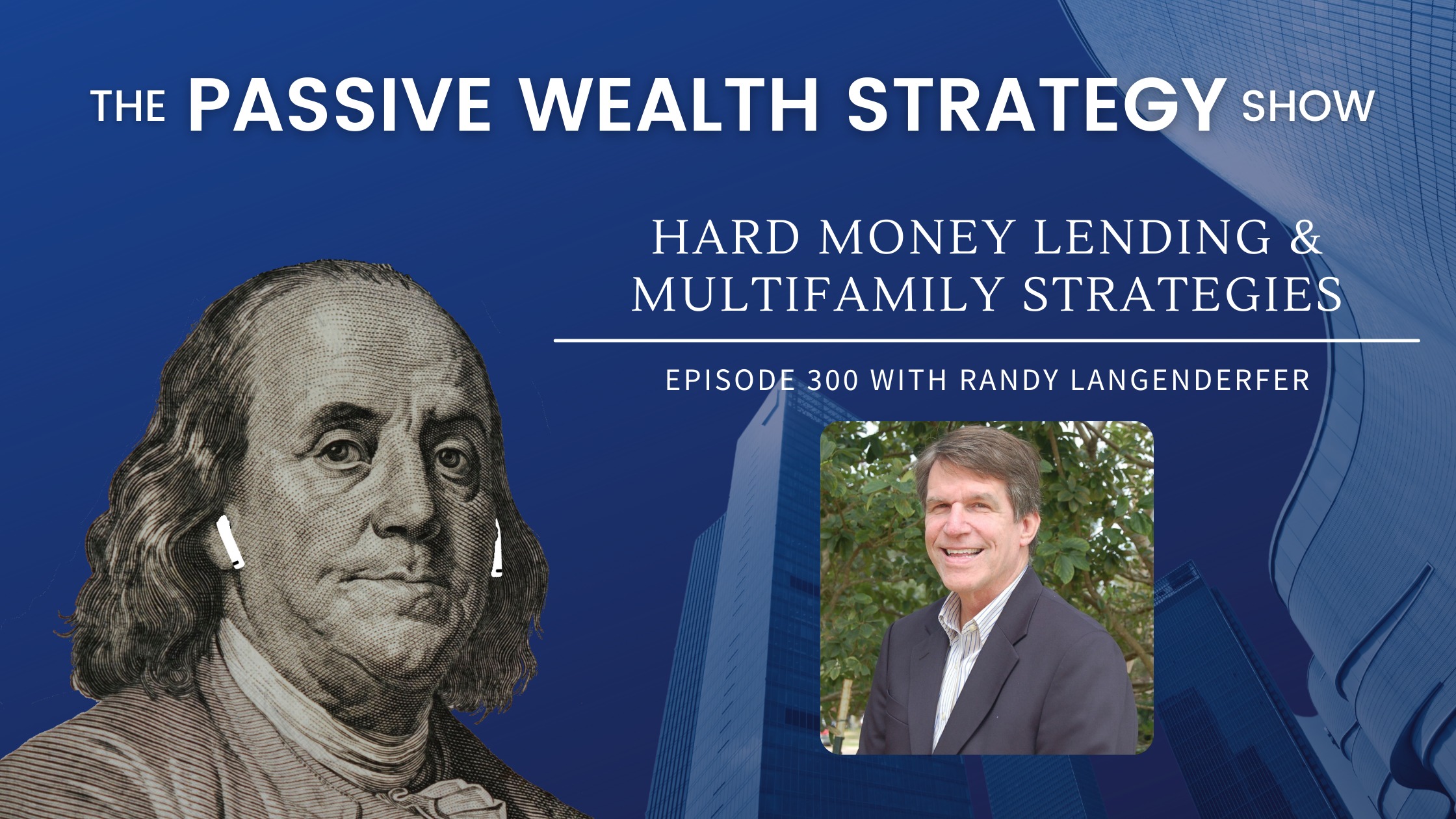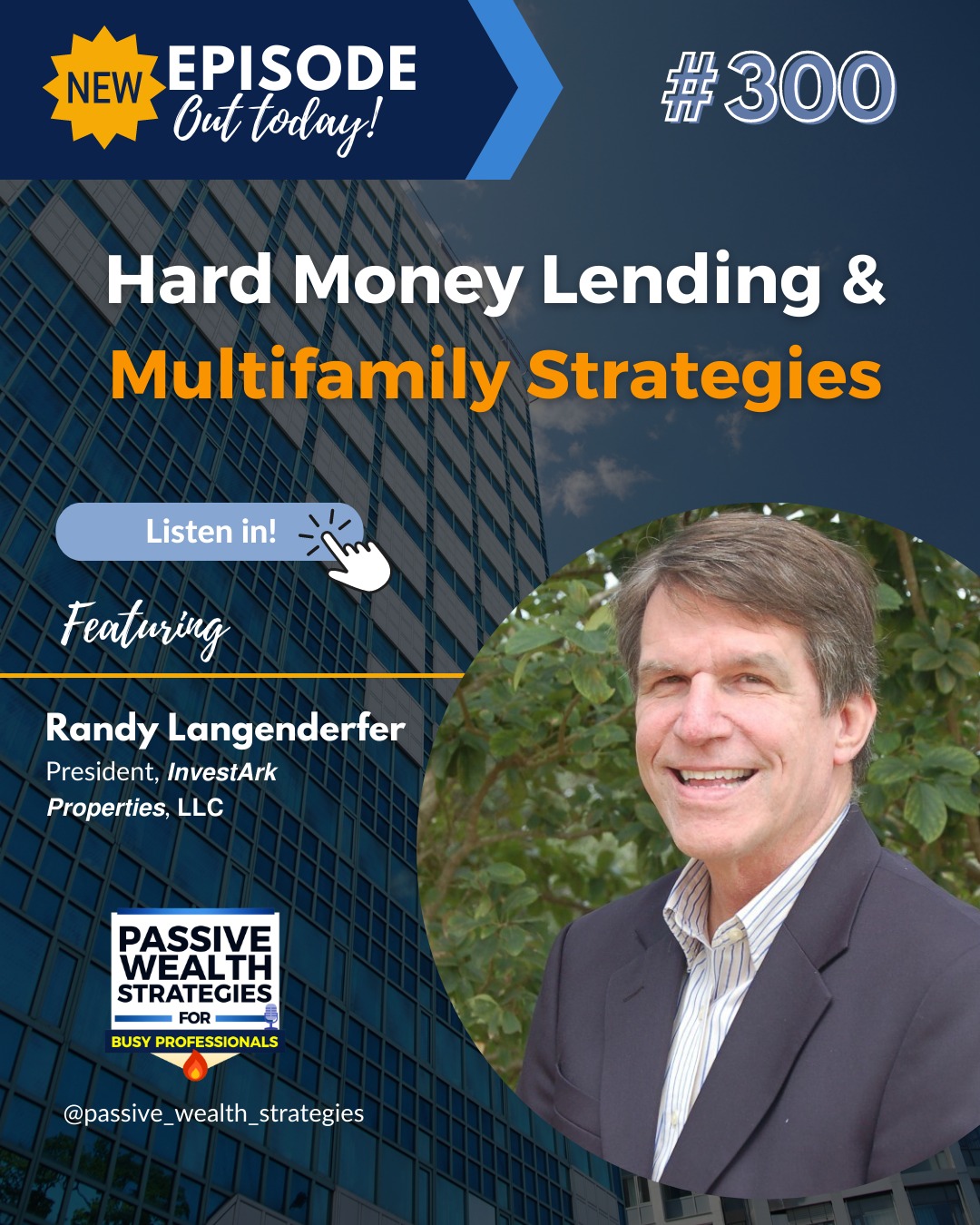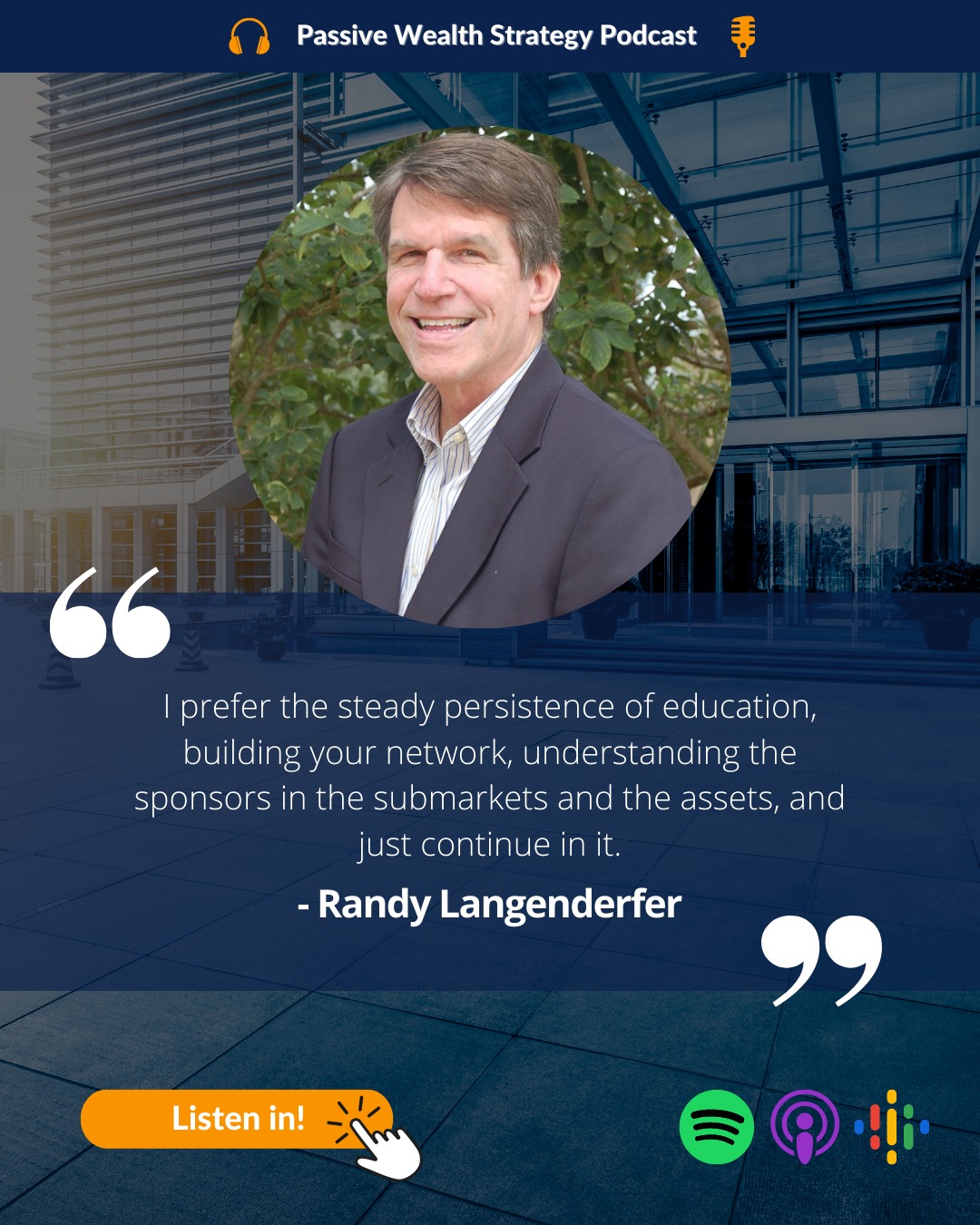
Hard Money Lending & Multifamily Strategies with Randy Langenderfer
Randy. Thank you for joining us.
Taylor. It’s my pleasure. I look forward to the conversation and hopefully providing some value to your listening audience.
Absolutely. You have a wealth of experience and we’re going to do a little bit of a deep dive in one particular area today for our listeners out there who don’t know about you and your background.
Can you tell us about what you do and what you do?
Thanks. Thanks again. So Randy Langenderfer, I currently live in Houston, Texas submarket. I am both the GP KP and about 250 doors. And I’m a LP and several thousand doors over the last since 2014, what’s those seven and a half years or so I’ve been in a multi-family space.
And before that, I got started in real estate in the single-family space. As a hard money lender at the time, I let me go into however much you want and all this, but a hard money lender living in Cleveland, Ohio, flipping houses in South Florida, Dade County, and moved to Houston for business purposes.
I still have a W2 job have a family. So, I am also a W2 that distinguishes me, I think, as a passive investor, I’ve got a lot of experience and look at a lot of deals like probably you do. And I think that gives me a much better view when I am a GP looking at deals, as well as to how the passive investors succeeded.
Great. And, there are a few things that I want to discuss there. First, let’s touch on your experience as a hard money lender and why you would make the shift from hard money to multifamily.
So I started out, I’m a corporate guy, still, I’m a corporate guy and on my day job ideal in the, I’ll say the governance risk areas.
Corporate compliance, privacy, it security. Audit services are my areas of expertise in the corporate world. So I labeled those under risk mitigation headings. And so every time I come to an investment, I look at it from a risk perspective as a corporate guy. That’s just smart. That’s just my background.
If somebody else comes from a marketing perspective, but if that’s their corporate background, but I got into this seven and a half I got back, I got into. Real estate, I’ll say in about 2009, I have to live in the Cleveland, Ohio market. At the time I had a brother-in-law who was recently displaced from a large regional bank there.
And the other Cleveland Ohio market guy, I really expected, came to me after going to Armando Mon for light glows flipping school. And he’s a late-night infomercial guy. If you ever can’t sleep, you can find them on one of the 2:00 AM. Real estate infomercials that last. But anyhow, he came to me and he had connected with a group out of south Florida at the time that he met and was interested in being a hard money lender.
And I didn’t even know what a hard money lender was at the time, but the bottom line is, as we connected with this group in south Florida, we became the money backers. We would. Give them the assets to buy the house, rehab the house, and then turn it in. So that has a lot of advantages. We did it for several years, several million dollars worth and we’re successful.
But I found that it was very time-consuming and difficult to scale for me. So every app. I had to look at the sub-market, the comps, and the, the mile three-mile five-mile radius. I had to get a lot of comfort with the repair budget as to how much they were going to put into it and the quality and how much of that would really be supported by the market comps in the area.
And though it’s successful and I really enjoyed it when I came here. I ended up going to the lifestyles unlimited conference here. There is a big educational arm in Houston, Texas, and I learned about multifamily and I learned that it’s a business in that It’s non-recourse debt, which really fascinated me that I can buy a multi-million dollar debt and never be held responsible.
Personally, I’ve been responsible, but I couldn’t, they couldn’t take my house in my car versus even in the single-family. Someone could Sue me and come after my personal assets. So the non-recourse interested me, the network of people and education alarms. I went from lifestyles unlimited to the summer I group in Dallas, Texas for a while.
And today I’m in rod Kalief’s organization as well, and then his mastermind and one of his personal coaches. So I get to spend a lot of time with you. Students in newer people to the industry, trying to make a transition. And I just really enjoyed I’m a real estate nerd.
Rod’s been on the show in the past and we had a great conversation with him.
Now you talk about risk mitigation. That’s really one of the things that strike. That’s one of the biggest downsides of being a hard money lender because you’re oftentimes writing a very large check. It might only be you really funding the thing and you don’t know what’s going to come up potentially in the rehab.
How big of a check were you writing? Typically as a hard money lender?
My partner and I would ride anywhere from a hundred to 150. Combined sometimes higher than that, it started to edge up as in 2009 and 10, it wasn’t hard to find deeply discounted houses anywhere in America because the whole economy was in shambles.
But as time went on in 2011, 12, it became more difficult. And though that industry still thrives today we were buying houses at 60, 55 cents on the dollar, then their market value and putting in. 10 20, $30,000. It was profitable, but yes, to your point risk there is certainly risk in the rehab risk in the people doing it, the flips, your comfort level with them, and then ultimately the market risk of what.
That acid is going to be able to sell for once it is rehab, right? Yeah.
Absolutely. Spend some time at Rayez and you’re going to meet people who have really gotten a flip wrong once or twice and potentially lost some money. And, we wish them all the best. But another aspect of lending that I think is a big downside that’s maybe not discussed is the tax situation.
So can you tell us about how that impacted you? You’re making a return, but. KA is being taxed. A lender is not quite the same as being a multi-family.
Yeah. When I was in the when you’re in that space, it, basically, it was I actually was doing it through a self-directed IRA, so it really, it wasn’t taxed, but if you’re doing it outside of it, you’re absolutely right.
It’s going to fall through if you’re in a partnership or a, an LLC, most likely is going to fall through straight to your ordinary income line on your tax return and be taxed at that ordinary income rate, because you don’t want to flip to go more than. You want to flip to be done in 12, 15 weeks, three to four months, ideally.
And so all that income does fall through right to your bottom line or your AGI, your adjusted gross income.

Hard Money Lending & Multifamily Strategies with Randy Langenderfer
It’s going to be probably the highest tax rate you’re going to pay on any money you make, but that’s smart of you to do it in a self-directed IRA. IRA, did you use a checkbook control IRA or just a straight How did you set that all up?
Yeah, I got started in a self-directed IRA at that time and I’m in, I have a couple of different accounts today. I still use them for passive investing. That’s either some people like that strategy to some don’t, but I did not do a checkbook IRA or a solo solo 401k. It’s just traditionally self-directed IRA and.
I’ll put my plugin. So, I said risk mitigation, that person in the corporate world, I like the idea of somebody else having fiduciary responsibility for that account versus a solo 401k account that I’m purely liable for all of the regulatory responsibilities and pluses and minuses. Odd. That’s not.
Say that a solo 401k or a checkbook IRA. Then, I use those terms. Synonymously are bad. It’s just, investors should know what they’re getting into. Absolutely.
It is. It is a bit iffy murky if you will. And there are some rumblings about. Maybe the legality of checkbook control or the ability to really keep it compliant is pretty difficult depending on who you talk to.
And, certainly, I don’t count myself an expert in that area.
I would agree with you a hundred percent Taylor, they’re going to get. At least three different reviews, three different views. If you talked to two different people there’s a difference and people just pluses and minuses. Yeah, absolutely.
So you made that shift into multifamily investing and one of the aspects of being a syndication investor that we have actually not touched on the show to my knowledge is. I’m not even going to get it right.
Being a KP. And I’d like to learn about your experience as a KP, deciding you wanted to go in that direction. Things you thought about, especially I love in the context of risk mitigation. So first off tell us what a KP is.
A KP is. And a key principle is someone on it’s, I’m only aware of it in the agency that the Fannie Mae or Freddie Mac debt there’s a general partner.
There’s a key principle. And then there are limited investors or limited passive investors. And so the key, the KP, the key principle is basically just a signatory. So when a syndicator needs to buy a $10 million, they’re buying a $10 million property and they need to take out an $8 million loan. They need to have a combined net worth of in this example, $8 million for the agency to accept the loan.
So many people may not have $8 million of net worth. So they partner with other people or they seek key principles. And that key principle. Is one who just helps them meet that mandate of the $8 million in my example. So I was able to add on the add onto that and help them achieve the objective.
And that opens one up to just a little bit more risk. So as that risk mitigation guy, I was very keen on understanding my potential liability and what that meant. And so my discovery is that I could be held personally liable if what’s referred to as the bad boy carve-outs within the agency, covenant agreements are broken.
So what’s. That, that just means in the loan documents, there are paragraphs that I referred to as they don’t label them bad boy, but that’s what people in the industry called them the bad boy carve-outs. And primarily that proof that says that if the property managers, the GPS, or to commit fraud, that the GPS and the KPIs could be held personally liable.
So the non-recourse and that example of the very, very worst. W the non-recourse would be broken and the GPS and the KPIs could be held personally liable. That means they could come after my personal assets, my house, my cars, any bank accounts in the very extreme case. So that’s what a KP does, or why any ask, why would someone sign up for that?
Good question. Why would someone sign up for that? Because I had. Doing investing for a couple of years and passively, and I had the desire to move into an active role. And I wanted to be a GP and sponsor a deal. And so you can’t just walk into the agency or a broker agency and say, Hey, I want a Fannie Mae loan for $5 million.
They’re going to say, what’s your experience. And so you have to have, what’s referred to like your agency card, you have to be on a loan as a guarantor, either as a GP or a KP. So why would someone be a KP and alone because they want to get their agency? To start with that means I was a passive investor.
I was able to get my credibility from the agency. So then when I did come back to the agency, Fannie Mae, Freddie Mac, as a sponsor or GP, I had credibility. It’s just like getting a credit card. I had a history. I had a history with the agency. Very simply. If that makes sense.
Yeah. That’s a good way to put it. Now, did you receive any additional compensation or equity sheriffs for putting that up? Because, unless you really want to get on it is the risk still worth it to get back card, and once you’re on, would you really keep doing it? Was there any financial incentive?
I wouldn’t advise your listening audience to be a KP on many a and I wouldn’t advise them to be a KP unless they really wanted to become a GP at some future point. I don’t see why you’d want to even have that remote risk of that happening, but there are, I think the answer to your question, Taylor, there are all different kinds of models.
So there are some sponsors that are willing to give an equity stake for signing as a KP and alone. There are some that will give you a flat fee. And I quite honestly did it for no comp, no additional compensation at all. That’s the only one I’ve ever signed on is a KP. But I would say that back to the risk mitigation.
I was the third in line and I knew very well to two people in front of me had a whole lot deeper, valid balance sheets than I did. So my simple risk mitigation was if the worst were to happen they’re going to go after those two guys before they come after me. And that may be maybe rather selfish, but it’s factual,
But there still is, I have to assume you went a bit deeper in.
Your risk mitigation strategy and you didn’t just, get a hat. The deal sponsors names in it, and just pick one and go with that. That’s true. I’m sure you had some, you had experience from for the past. So what did you do to select the sponsor that you wanted to be a KP?
So that’s a great follow-up question and clarification I should have provided you earlier. Thank you. No worries. So you’re right there. Your audience will see many, I’ll say. Email blasts out from sponsors today. Hey, do you want to be a KP sign up for this sheet if you want to be a KP? And so back to the answer to your question is I knew very well.
The two people they, that I had signed in front of me. And so it was two people that I had known very well from the Sunroc organization. One was Brad rock himself, and the other one was Kenny Wolf who has done a lot of Investments. And so they were much earlier in their career. This was five, six years ago.
But still, I knew those people, I won’t say intimately, but I knew them very well. I knew their conservative approach. I knew how they underwrote things. I knew they had investors in mind. They had a very good track record. Which, if anybody on your listening audience is considering being a KP, you really need to get to know the general partners.
Their track record if it’s their first time, that’d be a red flag for me, but if they’ve done 20 or 10 and they’ve had great success in their extended new a courtesy, and maybe they’re going to give you a flat fee or some percentage, and you want to be a general partner. It’s probably worth considering.
So fair enough. Fair enough. And those are two great guys to a sign on the dotted line next to you. Those are two very experienced names especially now, and I’m sure, at the time they were had plenty of experience too.
Is that something happy to say that the property I signed on this.
Kicking button taking prevalent prisoners. We still own it seven years, six years later, and it’s doing very well and good.
It’s very common at that at, after a few years to refinance, did you choose to do that, or were there, prepayment penalties, things like that, that you weren’t able to do?
Six years is a while. You’ve probably added a lot of. Other investors might want some of their capital back, but Hey, we’re going to keep owning the property. So what was the decision there?
The thought process was, is that I think it’s, I think it’s six years today going on seven sometime this year.
So that is a long time in the syndication world, but we did refinance took a bunch of money out of year three. I think it was to the investing community. And we actually just had a conversation as the group, probably six, nine months ago about selling it versus keeping it. And it was a consensus to keep it just because.
I’m really glad one you’re deferring the tax game to the market nine months ago through today and for the next 12 months or so, it was only gonna, the property sits in Columbus, Ohio in a very advantageous part of Columbus. So it was in my mind. Th there’s some, not a bad decision. We could have sold it, taken more than doubled our money and we keep it and let the yield maintenance burn off a little bit more, and then decide what to do.
Refinance it again, and take all your money out, or do you want to, and I’m happy with that strategy to re-take all my money out and just take the quarterly distribution infinite. I’m good with that as an investor.
That’s good. Are those refinances, is that like supplemental loans, or how did that all happen?
Yeah. Agency loans, you’re able to take out a supplemental loan, which really means in our example, year three, you take out, the first loan was a 10 year, 10 years, 30-year amortization, 10-year maturity. So listeners mean that amortizes at a 30-year rate, but in 10 years you got to refinance or sell it.
And that’s what the maturity rate is. And so when you take out a supplemental. In year three, you, the PR we had shown a lot of value in the property that first three years. So we had increased the NOI. And so the agency allows you, Fanny, in this case, allows you to take out a supplemental loan. And that is basically.
They look at the current value of the property, NOI divided by the cap rate and they see that it’s worth a million dollars stay, you paid 754. So in this little example, you have $250,000 of increased value and we’ll give you. I think it’s 70% or 70% of that. Two 50 is called a supplemental loan.
And generally, that’s just a return to investors and everybody’s high five in each other and saying, thank you very much. So you basically have two loans that are on that tenure pace though. You have one that was one through 10 and you have one that’s years, four through 10, but the property has continued.
Has continued to grow over the last several years. It was a winner and groups just have to decide what they want. Take the quick win and take the quick money and run. I was in another one recently as a passive investor. Actually, the guy just called me Friday night and said that we’ve been in 12 months he’s he won him, he’s got a signed purchase order to sell it, gonna double our money.
Wow. 12 months. That’s what I said. And I’m like, okay. I said, there’s no wrong answer here. If we held it, I think it would continue to increase in value in the next 12 months.
But these are first-world problems that it’s hard to go broke and make a profit, which is my favorite saying, so I like that as a risk mitigation guy.
You’ve seen all this appreciation in the market. Your time to, you’re getting into. During the sale of a lifetime and in 2009. And what are your thoughts about, is that going to happen again? Debts continue to get cheaper. Even though the whole time I’ve been a real estate investor, people have said, oh, the next crash is right around the corner.
And that’s probably the case for you as well. What do you think about the future? We’re not obviously making any recommendations. We’re just given thoughts. So what do you think about the next few years?
I like to joke that you get what you pay for and you’re not paying me. I think Taylor’s opinion is not worth as much as worth as the next guy, but I would say I’m bullish on multifamily and commercial real estate.
Then, I guess the short answer is I think you should buy in every market up, down, and sideways and you should always be looking, but it always depends on how your, what your assumptions now are, and how you’re underwriting them. Yes, the market is pretty much across the country. Insanely hot for multifamily right now, but.
I have this conversation with a couple of my partners, what are we going to look back five years from now and say the prices we’re experiencing today were ridiculously cheap. Maybe. I don’t know. I tend to be A little more war-torn and say, that’s probably not going to happen, but I think if you buy right, the assumptions that you buy, you take the long-term debt out.
You don’t buy in the hood, you buy solid assets, you take out long-term debt on them. So you have one less verb on the table and you manage it extremely well. I think there is with inflation coming that you’re going to see natural appreciation continued on these kinds of assets. And I really think from all the people I listened to and read to this is going to be the next five to seven years.
The year of the operator, that’s going to distinguish people from those who are average operators and those who are above average operators.

I prefer the steady persistence of education, building your network, understanding the sponsors in the submarkets and the assets, and just continue in it.
Randy Langenderfer Tweet
That is a good way to put it. Great. A great thing to bring up is the quality of the operator. So fantastic. Right now, we’re going to take a quick break for our sponsor.
All right, Randy, I’ve got three questions. I ask every guest on the show. Are you ready? I’m ready. All right. Great. First one. What is the best investment you ever made other than in your educator?
The best investment ever made other than my education. I’m gonna say the first one, the best one is marrying my wife.
That’s on a personal vein and the second vein I would say is my formal education. I am a finance guy, MBA CPA. So that’s one thing, but I’ll invest in your real estate education. Your listening audience invests in your real estate. Education many people are reluctant to spend money on one of the educational arms or go to a seminar or whatever.
And, we have spent a lot of money getting. Technical degrees, undergraduate degrees, graduate degrees. And I just, I’m always floored when somebody won’t spend 300 bucks or 500 bucks to go to a seminar, even a thousand. I understand that’s a lot of money for some people, but you get what you put into it.
So invest in yourself. And the other best investment I ever made was a four X return on a multi-family property.
It was four X in 20, 23 months, less than two years. Crazy. Wow.
That was probably a few years ago. I would bet.
You know I think the property was sold in 18 and it was 16 to 18 or 15 to 17 time period. But that was a unicorn. I don’t think we’ll ever see that again. That may be not never, but a long time.
It’s good to look for base hits, not always, the grand slam home run. Again, nobody ever went broke making a profit. We had the best investment. Now we go to the other side of that coin, the worst investment. What is the worst investment you ever made?
I prefer to think of him as learning lessons.
The worst investment, I’ll say to you, two of them, one in the single-family space. Lesson learned is one of the people we funded money to in a single-family space. Lost the house. I was in a second mortgage position and basically, I’m still suing the person today over oh man. And that’s when I was getting into multifamily.
And then my first investment in multifamily was a. 225 unit. This is the subject of another whole-hour podcast, a 225 unit in port Arthur, Texas. For your listening audience, that’s about 150 miles due east of Houston sits right on the ocean. It was another sponsor who I know and trusted. We bought it within the.
16 months. He returned first 12 months. I’m sorry. He returned 60% of the investment. So we’re all going. He had refinanced and we went to Ching. I thought I was a smart guy. I’m feeling pretty pumped, followed by fraud, followed by a fire, followed by a pandemic. And we finally sold it and we didn’t make any money on the deal at all, but we got all of our capital back.
We didn’t lose. Not necessary. So the three listing audiences, they’re all a business, bad things can happen. And we try to ensure that it doesn’t happen, but bad things can happen. And on a portfolio wise. So I’d say that’s the worst performing, but I’ve had four X and several, two twos, and two threes.
And, but lessons learned and they only make you stronger.
Absolutely. And it’s good. Good. You got your money back or you have the downside of having to sit out the market for that amount of time. So you’ve, it’s opportunity costs and all of that, but you got your money back. So there you can do certainly do worse.
And I’ve never been in, I’ve been in 18, 19 different syndications as either passive or active, never had a capital call, never want to have a capital call. I hope there never is a capital call. So it’s still hard assets in a very good investment class for people to invest.
Absolutely. My favorite question here at the end of the show is what is the most important lesson you’ve learned in business and investing?
The most important lesson learned I’m going to go with.
Persistence and steadfastness. So I would say that if I have a skill, it is that its persistence. And versus there are many people in this that get into it with a, get rich, get quick, get rich, quick mentality. And it can happen. Then it has happened to some and has happened even many, but I prefer the steady persistence of education, building your network understanding the sponsors in the submarkets and the assets and persistence just continue in it.
And. There are a lot of people out there and a lot of great assets.
Absolutely. I certainly relate to that. Sometimes I look at my own, I don’t want to get a big head. I don’t think about it as persistence. I just say stubbornness. I’m just very stubborn. I’m just going to keep cracking away until I get what I want.
Keep going because you got to, could have easily said stubbornly.
It’s a little more pejorative than persistence, but Randy, thank you for joining us today. And in filling us in on a number of topics, particularly the KP strategy, if you will, why am I doing it? Why do you do it and why others might do that as well.
If folks want to reach out, they want to get in touch with you. If they want to learn about the deals that you’re sponsoring or talk about, your passive investing experience, or whatever. Where can they track you down until then?
Thanks again for the opportunity to be here. And the easiest way to catch me is on my webpage, which is invest-ark.com.
There’s a contact us page on there, and I would really enjoy speaking to anybody from your podcast as to where they’re at in their real estate journey and love to help them. If I can.
Great. Great conversation with you. It’s a great way to spend a Sunday night or whenever our listeners happen to be tuning in.
That’s just when we’re recording on a Sunday night and to everybody out there, I want to thank you for tuning in. If you’re enjoying the show, please leave us a rating and review on apple podcasts that help other people learn about the show, because that helps us rank higher in the apple podcast ecosystem.
And I’m always honest with you guys that makes me feel good. That gives me the warmth and fuzzies because I get to see that you’re engaging with the content and you’re escaping the wall street casino. With us. If you know anyone who could use a little bit more passive wealth in their lives, please share the show with them and bring them into the tribe.
I hope you have a great rest of your day and we’ll talk to you on the next one. Bye-bye.

Invest Ark
About our Guest

Randy Langenderfer
Randy has been investing in real estate since his first primary residence purchase of a duplex. He got his commercial real estate start as a private money lender in the remodeling of single-family homes in South Florida, Ohio and Texas with a combined market value in excess of $2.5M. He invested in several assets as a limited partner and progressed into the general partner role.
Today, the InvestArk portfolio has invested in over 4,000 units in TX, OK, OH and LA. His investment goals have always been focused on providing above average passive income to investors by improving communities using a safe and time-tested approach.
Episode Show Notes
Podcast Show Notes







